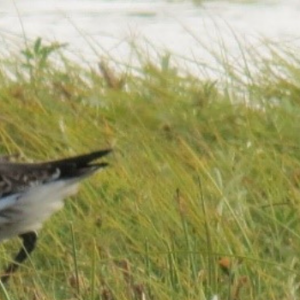Precedent setting ruling to defend Species at Risk: Western Chorus Frog
A fight to protect the Western Chorus Frog has resulted in a precedent-setting legal decision. This 2018 decision of the Federal Court has affirmed the Federal Government’s authority to issue emergency orders to protect the habitat of species-at-risk located on provincial lands. The decision affirms the federal government’s authority to protect at-risk species and their habitat and should future court decisions. This is important in a time where biodiversity, particularly species already at risk, are lost at an alarming rate.
What is the Western Chorus Frog?
The Western Chorus Frog is a small (approximately 2.5 cm long) brown, grey or olive tree frog with three dark lines along its back and one larger line on each side. It is is found in approximately 100 wetland locations divided into two populations: the Carolinian population of southwestern Ontario and the Great Lakes / St. Lawrence – Canada Shield population (GLSLCS) in regions of Ontario and Quebec. The GLSLCS population is threatened, mainly due to habitat destruction and fragmentation, particularly in suburban areas of southwestern Quebec.
What Legal Protections Have Been Put in Place?
In 2008, the Committee on the Status of Endangered Wildlife in Canada (COSEWIC) assessed the Western Chorus Frog GLSLCS population as Threatened. Subsequently, in 2010, it was listed as Threatened under the federal Species at Risk Act (SARA). However, the strongest habitat protections afforded by SARA did not apply to much of the GLSLCS population because the relevant habitat did not lie on federal land. Thus, in 2013, Nature Quebec asked the Minister of Environment to issue an emergency protection order for the La Prairie population of Western Chorus Frogs under SARA. The Minister refused to make the recommendations and so Nature Quebec initiated a judicial review in Federal Court, seeking mandamus; an order to the Minister to make the recommendation. In its 2015 decision, Québécois du droit de l’environnement v. Canada (Environment), 2015 FC 773, the Federal Court set aside the Minister’s refusal as unreasonable and ordered her to reconsider the decision. The Minister undertook an extensive information gathering process and concluded there was imminent threat to the recovery of the Western Chorus Frog. Thus, in July of 2016, the Federal government issued an emergency order to protect Western Chorus Frog habitat in La Prairie, Quebec. The emergency order prohibited, among other activities, the construction of infrastructure, structure or barriers on approximately 2 km2 of partially-developed land in the municipalities of La Prairie, Candiac and Saint-Philippe, Quebec. The prohibitions were intended to prevent the loss and degradation of essential Western Chorus Frog habitat and prevent activities which could harm the species.
Legal Precedent and Implications
This decision was contested by a housing developer, Groupe Maison Candiac, who had previously received authorization from the province to build a housing development on part of the 2 km2 at issue. The developer applied to the Federal Court have the emergency order invalidated on the grounds that
- (1) the provision of SARA which enables the Minister to, within the emergency order, prohibit activities on non-federal land, is outside the constitutional jurisdiction of the federal government, or
- (2) the emergency order is expropriation without compensation, which is prohibited by s. 952 of the Civil Code of Quebec and the common law rule of de facto appropriation.
In the resulting decision, Le Groupe Maison Candiac Inc. v. Procureur General Du Canada, 2018 CF 643, the Federal Court rejected these arguments, finding that the section of SARA which enables the federal government to prohibit activities on non-federal land via an emergency order is a valid measure of criminal law, which falls under the jurisdiction of the federal government. The Court found that the relevant section of SARA:
- pursues the legitimate public purpose of environmental protection first recognized in R v. Hydro-Québec, [1997] 3 SCR 213,
- does not impinge on areas of exclusive provincial legislative jurisdiction, and
- has the attributes of a criminal law regime.
Further, the FC held that the concept of de facto appropriation does not affect the validity of the emergency order because Parliament had provided for a compensation mechanism for the losses suffered as a result of the emergency order within SARA but limited its scope to extraordinary consequences.
Congratulations to Nature Quebec! Without their initiative, the emergency order and resulting decision may not have come about.
This recent decision is important for Nature Canada’s Greater Sage Grouse Case
An emergency order has only been used to protect a species at risk twice since SARA came into force in 2002. An emergency order was issued in 2013 to protect Greater Sage Grouse habitat on Albertan provincial lands. The sage-grouse has been listed as an endangered species under SARA and the Alberta Wildlife Act for some time, but was afforded little protection under these mechanisms. Recognizing these shortfalls, Nature Canada wrote to then-Minister of the Environment Peter Kent, urging him to issue an emergency order to protect the Sage-Grouse and its habitat. On December 4, 2013 the federal government issued the Emergency Order for the Protection of the Greater Sage Grouse (SOR/2013-202).
Now, the City of Medicine Hat and LGX Oil and Gas have applied to the Federal Court for a judicial review of the decision to issue the emergency order. The City of Medicine Hat and LGX Oil & Gas have requested that the Federal Court strike down the emergency order and the authorizing provisions of SARA on the basis that they are outside the federal government’s constitutional powers and so they unlawfully infringe on exclusive provincial legislative authority.
It is clear, based on the Western Chorus Frog case, that the federal government has the authority to prohibit actions in important sage-grouse habitat in order to protect the species, because this falls under the legitimate public purpose of environmental protection.



